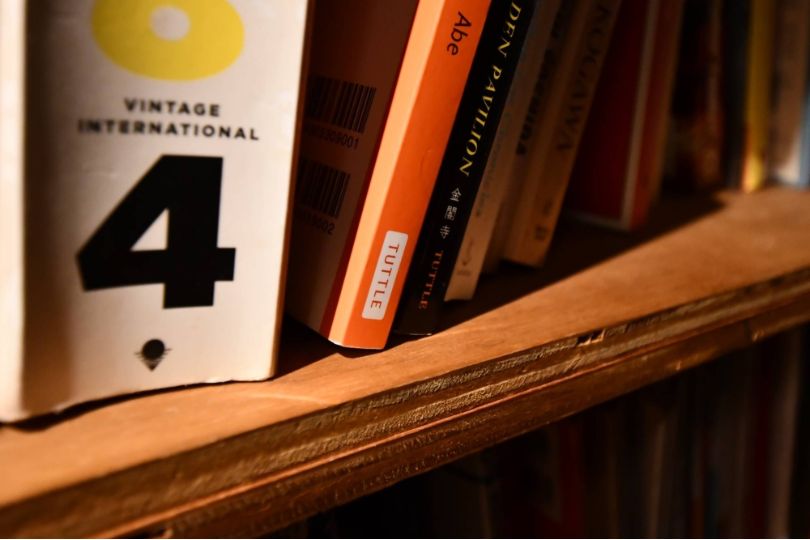Tuttle, an Asia Publishing Veteran, is Riding a New Wave of Enthusiasm in Japan
Discover Tuttle Publishing's rich legacy in Asian literature. From classics to graphic novels, explore the diverse world of books under Eric Oey's leadership.on Jan 04, 2024

Those who read widely and have an interest in Asia — potential readers of this piece — will have picked up a book published by Tuttle Publishing at some point. Tuttle's little red emblem can be found in bookstores all around the world, on volumes ranging from Korean-language study materials and Indonesian cookbooks to translations of great novels and Japanese death poetry.
While the Tuttle family business can be traced back to 1832, making it one of the oldest American publishers still in operation, the Japan presence was established in 1948 when Charles Tuttle, who was married to Japanese singer Reiko Chiba at the time, noticed a gap in the market while based in the country.
Tuttle first came to Japan as part of the American Occupation to work in the newspaper industry, but he soon began importing American books for US troops stationed there, as well as ferrying Japanese literature back to the US for interested readers.
Later, he reportedly launched Tokyo's first English-language bookstore before self-publishing thousands of Asia-focused books. Tuttle was granted the Order of the Sacred Treasure by Emperor Showa prior to his death for his efforts.
Tuttle is now led by Eric Oey, a distant nephew of the founder who founded the Indonesia- and Hong Kong-focused publisher and book distributor Periplus Group in 1985. In 1996, the consortium purchased Tuttle Publishing's US and Japanese operations.
Oey, who began his career as an academic before "dropping out of school and deciding to publish books full time," appreciates the business.
"Because it was so much fun, book publishing gradually took over my life." "I've never looked back on it," he remarked. The group's Asia-focused purpose continues under Oey, with translations of the region's literature and books on its crafts and history becoming a permanent fixture among titles. The group now employs over 300 people, the vast majority of whom are situated in Asia.
"We still publish all the types of books for which Tuttle is well known — cookbooks, martial arts, art and architecture, children's books, and many other categories as well," Oey explained, adding that the group has lately begun to develop graphic novel renditions of Asian classics.
A volume of Haruki Murakami stories transformed into manga was added to the catalogue recently, and folk tales and legendary ghost stories from Japan have also been translated into graphic novels.
While graphic novels and illustrated books are becoming increasingly popular and attracting the attention of publishers, other industry advances, such as artificial intelligence, are difficult to assess.
While Oey believes it is "too early to tell" what influence AI will have on the publishing industry, he believes there is minimal chance of print books being replaced by digital counterparts anytime soon because e-book sales have decreased "while print sales have soared" in recent years.
While the books are primarily about Asia, the United States has always been the publisher's main market, accounting for slightly more than half of total sales, according to Oey.
"The rest of the world is fairly represented — Canada, the United Kingdom, Australia, New Zealand, Southeast Asia, and, of course, Japan." "We are well established here because Tuttle has been in Asia for 75 years," he said.
North Korea, which condemned South Korean journalists to death in absentia in 2017 for criticising Tuttle's book "North Korea Confidential," which the country's rulers felt offensive, is one Asian country where Tuttle is unlikely to be welcomed. The book is still in print.
Tuttle's regional scope has been a differentiator for the publisher, according to Oey. While there are a few independent publishers focusing on Asian literature, such as Ethos Books and Camphor Press, Tuttle was historically one of the only ones.
Tuttle's lengthy history in the market means that it has a large back catalogue that is presently in high demand, thanks to the current surge in interest in Japanese culture. Tuttle's early print editions have become increasingly popular as interest in Japanese authors has expanded.
When Infinity Books, a Tokyo events venue and secondhand bookstore, obtains Tuttle books, they are frequently Japanese literature masterpieces from the 1960s, 1970s, and 1980s, according to Nick Ward.
"Because they're hard to get hold of ... they can go for silly prices sometimes, because people collect them or tourists want Japanese literature," he went on to say.
Ward claims that demand for these English-language versions frequently exceeds supply. Tourists, in particular, go to them in search of Japanese stories to take home as keepsakes.
While many tourists seek Haruki Murakami, Ward and his team steer them towards other authors, and "they invariably walk out with (Yukio) Mishima, (Yasunari) Kawabata, all the classics," he said, adding that modern Japanese fiction was also popular.
Despite long-held predictions of the death of print or the end of books, Oey believes the business is strong and thriving.
Tuttle observed an increase in book sales during the pandemic in 2020 and 2021, and while this has dropped slightly, "book sales are now higher than before the pandemic."
"Overall sales of books have always been increasing each year for several decades," he remarked.
The assumption that "people are reading less today" is "another misconception," he says.
"That's not the case, and in fact more books are being published and read today than ever before."

.jpg)
.jpg)
.jpg)
.jpg)
.jpg)
.jpg)

.jpg)
.jpg)
.jpg)
.jpg)

.jpg)
.jpg)
.jpg)
.jpg)










Sorry! No comment found for this post.